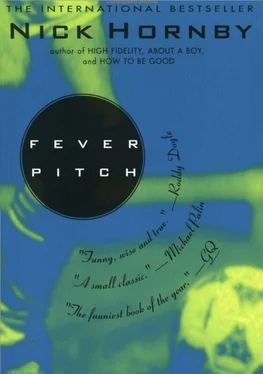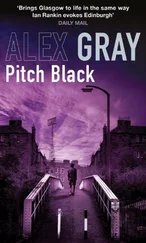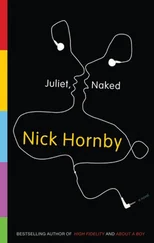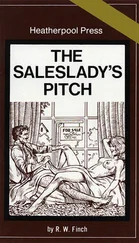At our destination we were met by hundreds and hundreds of police, who then escorted us to the ground by a circuitous route away from the city centre; it was during these walks that my urban hooligan fantasies were given free rein. I was completely safe, protected not only by the law but by my fellow supporters, and I had therefore been liberated to bellow along in my still-unbroken voice with the chanted threats of the others. I didn’t look terribly hard, in truth: I was as yet nowhere near as big as I should have been, and wore black-framed Brains-style National Health reading glasses, although these I hid away for the duration of the route marches, presumably to make myself just that little bit more terrifying. But those who mumble about the loss of identity football fans must endure miss the point: this loss of identity can be a paradoxically enriching process. Who wants to be stuck with who they are the whole time? I for one wanted time out from being a jug-eared, bespectacled, suburban twerp once in a while; I loved being able to frighten the shoppers in Derby or Norwich or Southampton (and they were frightened—you could see it). My opportunities for intimidating people had been limited hitherto, though I knew it wasn’t me that made people hurry to the other side of the road, hauling their children after them; it was us , and I was a part of us, an organ in the hooligan body. The fact that I was the appendix—small, useless, hidden out of the way somewhere in the middle—didn’t matter in the slightest.
If going to the ground was all glory and raw power, standing inside it, and getting back to the station afterwards, was less invigorating. Violence inside the grounds has all but disappeared now, for a variety of reasons: fans are separated properly (back then, if you fancied your chances in the opposition end, you could just walk through the turnstiles), away fans are usually kept back after games until the stadium has cleared, the policing is a lot more sophisticated, and so on. For the first half of the seventies, however, there was a fight at every single Arsenal game I attended. At Highbury they mostly took place on the Clock End, where the opposition’s fans stood; usually they were brief flurries, Arsenal fans charging into the enemy, the enemy scattering, the police taking control. These were ritualistic charges, the violence usually contained in the movement itself rather than in fists and boots (it was this “running” that caused the Heysel tragedy, rather than any real physical attack). But occasionally, particularly against West Ham, Tottenham, Chelsea or Manchester United, the trouble was just as likely to be at the North Bank end of the ground where the noise comes from: when away fans could amass sufficient numbers they would attempt to seize the home fans’ territory as if it were an island of strategic military importance.
Consequently it was very difficult to watch football safely at away grounds. Standing in the section “reserved” for visitors didn’t ensure any protection; in fact, it merely informed the opposition of your identity. Standing at the other end was either dangerous (if the Arsenal fans were intending to invade the home end) or pointless—why bother to travel half the length of the country if you then had to pretend to support the opponents? I settled for a place along the side, if possible, where it was quiet; if not, then in the “away” end, but towards a corner, as far from the more gung-ho, members of the Arsenal touring party as possible. But I never enjoyed away games. I felt constantly nervous, often with good reason: at random points throughout the afternoon, fighting would break out, prefaced by the same kind of roar that greeted a goal; but the fact that the roar might occur when the play was nowhere near either end of the pitch was disorienting in the extreme. I have seen players look around, perplexed that their efforts at a throw-in should meet with such vocal enthusiasm.
The afternoon at Derby was worse than most. There had been trouble before the game and at sporadic intervals during it, and though I was way down the terraces, hidden among younger kids and their fathers, I was scared—so scared that in fact I was ambivalent about an Arsenal victory. A draw would have suited me fine, but I could live with defeat and an exit from the Cup if it meant I could get back to Derby station without anything untoward happening to my head. It is at times like this that the players have more responsibilities than they could ever perceive or understand; in any case, this sort of perception was not one of Charlie George’s most obvious qualities.
Charlie George is one of the few seventies icons who has so far managed to avoid being deconstructed, possibly because he appears at first glance to be one of the identikit George Best/Rodney Marsh/Stan Bowles long-haired, wayward wasters who were two a new pee twenty years ago. It is true that he was as outrageously gifted as the best of the breed, and that these gifts were appallingly underexploited throughout his career (he only played for England once, and towards the end of his time at Arsenal could not even gain a place in the first team); all this and more—his temper, his problems with managers, the fierce devotion he attracted from younger fans and women—was par for the course, commonplace at a time when football was beginning to resemble pop music in both its presentation and its consumption.
Charlie George differed slightly from the rebel norm on two counts. Firstly, he had actually spent his early teenage years on the terraces of the club for which he later played; and though this is not unusual in itself—plenty of Liverpool and Newcastle players supported these clubs when they were young—George is one of the few genius misfits to have jumped straight over the perimeter fence into a club shirt and shorts. Best was Irish, Bowles and Marsh were itinerant … not only was George Arsenal’s own, nurtured on the North Bank and in the youth team, but he looked and behaved as if running around on the pitch dressed as a player were the simplest way to avoid ejection from the stadium. Physically, he did not fit the mould: he was powerfully built and over six feet tall, too big to be George Best. On my birthday in 1971, shortly before his goal against Newcastle, one of the frequent red mists that plagued him had descended, and he had grabbed a rugged Newcastle defender by the throat and lifted him from the ground. This was not misfit petulance, this was hard-man menace, and the likely lads on the terraces have never had a more convincing representative.
And secondly, he was not a media rebel. He could not give interviews (his inarticulacy was legendary and genuine); his long, lank hair remained unfeathered and unlayered right up until the time he unwisely decided upon a bubble perm from hell some time in the mid-seventies, and when he first played in the team, at the beginning of the 69/70 season, it looked suspiciously as if he were trying to grow out a number one crop; and he seemed uninterested in womanising—Susan Farge, the fiancée whose name I still remember, is intimidatingly prominent in most of the off-the-pitch photographs. He was a big star, and the media were interested, but they didn’t know what to do with him. The Egg Marketing Board tried, but their slogan, “E for B and Charlie George”, was significantly incomprehensible. Somehow, he had made himself unpackageable, media-proof—possibly the very last star of any iconic stature to do so. (For some reason, however, he managed to remain in the otherwise colander-like consciousness of my grandmother for some years after his retirement. “Charlie George!” she spat disapprovingly and opaquely circa 1983, when I told her that I was off to Highbury to watch a game. What he means to her will, I fear, never properly be understood.)
Читать дальше











